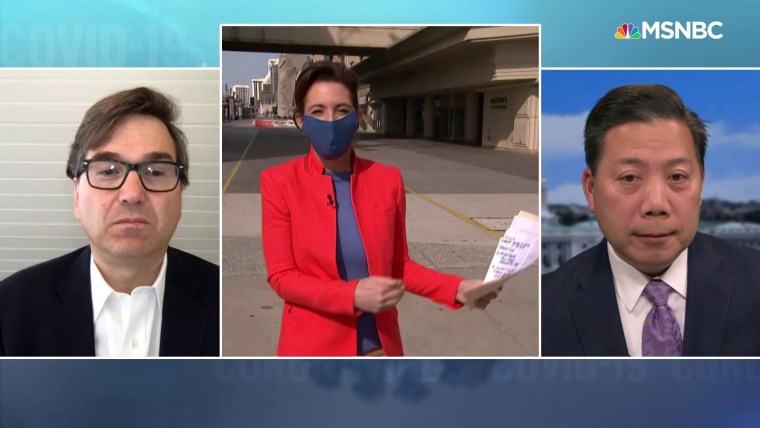While the April jobs report released Friday was catastrophic by any measure, labor economists say the data reveals the economic fault lines that put America’s poorest and least-educated workers at risk of falling through the cracks.
The Bureau of Labor Statistics recorded a loss of 20.5 million jobs in April that drove the unemployment rate to 14.7 — but even these stark numbers understate the true scope of the financial pain being faced by the American workforce.
The unemployment rate would have been closer to 20 percent if workers classified as “absent for other reasons" were included among the unemployed, the BLS noted.
“Add in the historic increase in U6 under-employment — to 22.8 percent from 8.7 percent — and you get a decent picture of the demand gap,” said Josh Wright, chief economist at Wrightside Advisors.
Average hourly earnings spiked by $1.34 to $30.01, but this shouldn’t be interpreted as a silver lining, warned Economic Policy Institute senior economist Elise Gould. “While workers across the economy lost their jobs in April, many of the job losses were concentrated in lower-wage jobs. Therefore, stronger wage growth in April reflects the dropping of lower-wage jobs from the total,” she said.
Put another way, the average wage has increased because workers earning the lowest wage now have no wage at all.
April appears to show stronger wage growth — but it simply reflects the plunge in lower-wage jobs from the total.
Let our news meet your inbox. The news and stories that matters, delivered weekday mornings.
Economists also pointed to sharper increases in unemployment among Hispanics and among women as evidence that the uneven impact of the virus-triggered downturn has hit vulnerable workers harder.
“High-contact ‘pink collar’ jobs that were previously safe from globalization pressures were very vulnerable to the pandemic,” Wright said, highlighting drops in healthcare and retail employment.
“Think about the fact that many of these jobs that have been lost really do involve people who have relatively low wages,” said Mark Hamrick, senior economic analyst at Bankrate. “We know that feeds into the distortion of some of the wage data.”
There is a strong labor market correlation between education and income, with lower-income, less-educated workers harder-hit in the early stages of this downturn — and growing evidence that they will face greater barriers re-entering the labor market, according to economists.
While unemployment among workers with a bachelor’s degree rose to 8.4 percent in April, this pales in comparison to the 21.2 percent unemployment rate among workers who never graduated high school.
“Many of those who were recently pulled back into the labor force are also among the most vulnerable to job loss in this recession,” said Madhavi Bokil, Moody’s Investors Service vice president.
In 2019, the Federal Reserve sought to preserve the hard-won economic gains realized by the poorest Americans. But now, those gains are in jeopardy.
In making the case for an “insurance” interest rate cut even when the economy was humming along, Federal Reserve Chairman Jerome Powell said in 2019 that the central bank sought to preserve the hard-won economic gains realized by the poorest Americans.
Now, economists say those gains are in jeopardy — or may already have vanished.
Bokil pointed out that the unique nature of this downturn and the fear of contagion and transmission of COVID-19 will hamper recovery in many of the sectors less-educated and lower-income workers depend on to earn a living. “Employment gains may be even slower than we anticipate as demand for leisure, entertainment, retail and travel will not normalize quickly,” she said.
LinkedIn chief economist Guy Berger said this foreshadows greater challenges these workers will face attempting to reenter the workforce. “Just the number of opportunities matters,” he said. “On average, I think this will hit people without college degrees harder than those with college degrees.”
“Those later entrants who lose their job in the current shock and have a weak attachment to the labor force may again take several years to return to the labor market,” Bokil cautioned.
For Americans already on the financial edge, this is a perilous prospect, but there has been little indication that proposals from some Democratic lawmakers for more comprehensive worker support or European-style employer subsidies will gain traction in a bitterly divided Capitol.
“If someone is struggling to pay bills even in the best of times, they begin to fall behind more quickly and more dramatically,” Hamrick said. “We don't really have a social safety net in our country, and some of these ugly truths now are coming into full view.”
"degree" - Google News
May 09, 2020 at 03:14AM
https://ift.tt/3cc2AwN
Workers without college degree hit hardest by record unemployment - NBCNews.com
"degree" - Google News
https://ift.tt/2zPqEHn
https://ift.tt/2WkjZfX
Bagikan Berita Ini
















0 Response to "Workers without college degree hit hardest by record unemployment - NBCNews.com"
Post a Comment